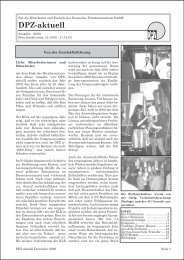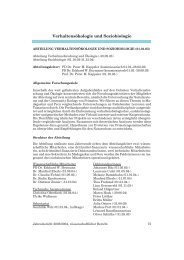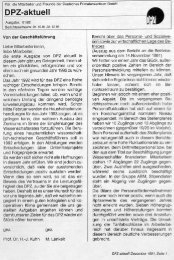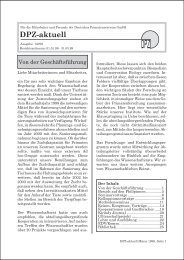General research objectives - DPZ
General research objectives - DPZ
General research objectives - DPZ
Create successful ePaper yourself
Turn your PDF publications into a flip-book with our unique Google optimized e-Paper software.
Department of Veterinary Medicine and Primate Husbandry<br />
Structure of department<br />
The Department of Veterinary Medicine and Primate Husbandry comprises the<br />
working groups Pathology and Primate Husbandry. The working group Pathology<br />
is headed by a scientist and includes the fields of pathology, bacteriology and parasitology.<br />
The working group is also responsible for managing the central electron microscope<br />
laboratory. The Head of the working group is supported by six technicians<br />
(two of those part-time) and a necropsy assistant. During 2000, the group also<br />
included another scientific assistant, a postgraduate student supported by the Göttingen<br />
<strong>research</strong> programme ‚Perspectives of Primatology‘, a postgraduate student of<br />
the School of Veterinary Medicine in Hannover, and seven independently funded<br />
postgraduate students.<br />
The working group Primate Husbandry comprises the sectors feeding, animal<br />
husbandry, veterinary pharmacy and laboratory diagnostics. Two veterinary practitioners<br />
are tasked with managing all veterinary aspects of husbandry and care of the<br />
breeding colonies. They also provide veterinary care for the experimental animals<br />
owned by the Departments of Reproductive Biology and Neurobiology. One veterinary<br />
practitioner is currently studying for a special veterinary qualification in the<br />
field of experimental animal care. A colony manager is responsible for all organisatorial<br />
tasks including acquisition and sale of animals. Further support is provided<br />
by fifteen technicians, part-time assistants and trainees. Together with the Department<br />
of Virology and Immunology, the working group also includes an EU-financed<br />
scientist responsible for the organisation of an EU project on estimating the risks of<br />
transmissible spongiform encephalopathies.<br />
Scientists<br />
Dr. Uwe Hahmann<br />
Dr. Petra Hofmann<br />
Dr. Christoph Knogge (-30.09.00)<br />
Dr. Kerstin Mätz-Rensing<br />
Other staff<br />
Karin Hampe (Job creation scheme,<br />
01.07.00-)<br />
P. Kekemenis (Job creation scheme,<br />
01.07.00-)<br />
PhD students<br />
Anja Blankenburg (01.08.00-)<br />
Karin Bingger<br />
Savio Freire Bruno (-01.04.00)<br />
Konstanze Kahnt (-30.06.00)<br />
Tanja Koch<br />
Emanuela Kunz (-30.06.00)<br />
Andrea Quohs (01.09.00-)<br />
Kathrin Schmidt<br />
Hanspeter Steinmetz (-30.06.00)<br />
Veterinary Care<br />
Susanne Rensing<br />
Dr. Monika Ziegler (14.06.00)<br />
Colony management<br />
Uwe Schönmann<br />
Secretariat<br />
Kira Gee (-30.09.00; part-time)<br />
Antje Pflüger (-31.03.00, graduate<br />
programme secretariat, part-time)<br />
Ingrid Rossbach (part-time)<br />
Technicians: Pathology<br />
Helga Gilhaus<br />
Erna Hackenbroich<br />
Wolfgang Henkel<br />
Karin Kaiser-Jarry (part-time)<br />
Nadine Knöchelmann (01.08.00-)<br />
Elke Lischka<br />
Eva Nicksch (-31.03.00)<br />
Hafiza Zuri<br />
28 Primate Report 60, July 2001














